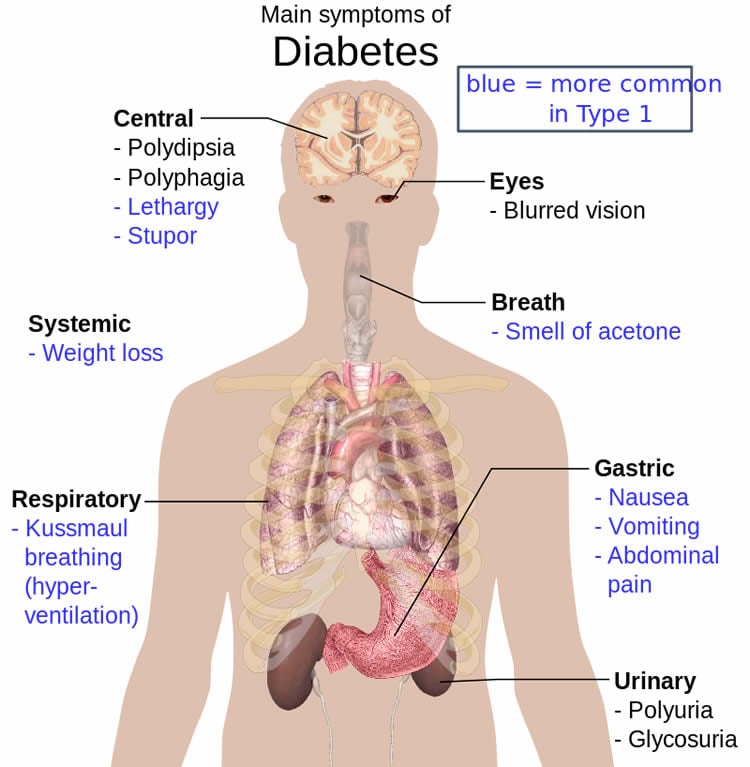In just two years, people with type 2 diabetes experienced negative changes in their ability to regulate blood flow in the brain, which was associated with lower scores on tests of cognition skills and their ability to perform their daily activities, according to a new study published in the July 8, 2015, online issue of Neurology, the medical journal of the American Academy of Neurology.
“Normal blood flow regulation allows the brain to redistribute blood to areas of the brain that have increased activity while performing certain tasks,” said study author Vera Novak, MD, PhD, of Harvard Medical School in Boston. “People with type 2 diabetes have impaired blood flow regulation. Our results suggest that diabetes and high blood sugar impose a chronic negative effect on cognitive and decision-making skills.”
The study involved 40 people with an average age of 66. Of those, 19 had type 2 diabetes and 21 did not have diabetes. Those with diabetes had been treated for the disease for an average of 13 years. The participants were tested at the beginning of the study and again two years later. Tests included cognition and memory tests, MRI scans of the brain to look at brain volume and blood flow, and blood tests to measure control of blood sugar and inflammation.

After two years, the people with diabetes had decreases in their ability to regulate blood flow in the brain. They also had lower scores on several tests of memory and thinking skills. People with lower ability to regulate blood flow at the beginning of the study had greater declines in a measure of how well they could complete daily activities such as bathing and cooking.
Higher levels of inflammation were also associated with greater decreases in blood flow regulation, even if people had good control of their diabetes and blood pressure, Novak said.
On a test of learning and memory, the scores of the people with diabetes decreased by 12 percent, from 46 points to 41 points over the two years of the study, while the scores of those without diabetes stayed the same, at 55 points. Blood flow regulation in the brain was decreased by 65 percent in people with diabetes.
“Early detection and monitoring of blood flow regulation may be an important predictor of accelerated changes in cognitive and decision-making skills,” Novak said.
She said additional studies involving more people and extending for a longer time period are needed to better understand the relationship and timing with blood flow regulation and changes in thinking and memory skills.
Funding: The study was supported by the National Institute on Aging, American Diabetes Association, Harvard Clinical and Translational Science Center and National Center for Research Resources.
Source: Rachel Seroka – AAN
Image Credit: Image is credited to Mikael Häggström and is in the public domain
Original Research: Abstract for “Inflammation-associated declines in cerebral vasoreactivity and cognition in type 2 diabetes” by Chen-Chih Chung, Daniela Pimentel, Azizah J. Jor’dan, Ying Hao, William Milberg, and Vera Novak in Neuron. Published online July 8 2015 doi:10.1212/WNL.0000000000001820
Abstract
Inflammation-associated declines in cerebral vasoreactivity and cognition in type 2 diabetes
Objective: The aim of this prospective study was to investigate the relationships between inflammation, cerebral vasoregulation, and cognitive decline in type 2 diabetes mellitus (T2DM) over a 2-year span.
Methods: Sixty-five participants (aged 66 ± 9.2 years, 35 with T2DM, 33 women) were enrolled for this 2-year prospective study. Continuous arterial spin labeling at 3-tesla MRI was used to measure global and regional cerebral perfusion and vasoreactivity. Neuropsychological measures were evaluated at the beginning and completion of the study. The associations between serum inflammatory markers, regional cerebral vasoreactivity, and cognitive functions were examined using least squares models.
Results: After 2 years of follow-up, participants with T2DM had diminished global and regional cerebral vasoreactivity and a decline in multiple cognitive tasks compared with baseline (p < 0.0001–0.012). In the T2DM group, lower cerebral vasoreactivity was associated with a greater decrease in daily living activities score (r2adj = 0.35, p = 0.04), and lower global vasodilation was associated with a greater decline in executive function (r2adj = 0.6, p = 0.047). Higher serum soluble intercellular and vascular adhesion molecules, higher cortisol, and higher C-reactive protein levels at baseline were associated with greater decreases in cerebral vasoreactivity and vasodilation only in the T2DM group (r2adj = 0.16–0.53, p = 0.007–0.048), independent of diabetes control and 24-hour blood pressure. Higher glycated hemoglobin A1c levels were associated with a greater increase in vasoconstriction in the T2DM group.
Conclusions: Inflammation may further impair cerebral vasoregulation, which consequently accelerates decline in executive function and daily activities performance in older people with T2DM.
“Inflammation-associated declines in cerebral vasoreactivity and cognition in type 2 diabetes” by Chen-Chih Chung, Daniela Pimentel, Azizah J. Jor’dan, Ying Hao, William Milberg, and Vera Novak in Neuron. Published online July 8 2015 doi:10.1212/WNL.0000000000001820






